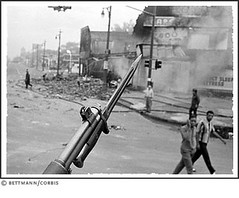
A National Guard bayonet shown on the street where the Rebellion struck during July of 1967 in Detroit.
Originally uploaded by Pan-African News Wire File Photos
Rebellions panel returns 40 years later
Santiago Esparza / The Detroit News
DETROIT -- The reconvened Kerner Commission, a panel that studied the causes of riots that rocked urban America in the 1960s, starts a six-city tour with Detroit next week in an effort to examine poverty and race issues.
It's a move that some hope will stir Americans to take a deeper look at the topics, just as the commission's original report produced discussion and outrage after riots broke out in American cities.
One of the last two living members of the original 11-member commission will visit Detroit, because it was one of the cities hit hardest by rioting. The hearings, which will take testimony from residents, will mark the anniversary of the commission's 1968 report.
Fred Harris, an ex-Oklahoma state senator who served on the initial commission, said some think economic conditions for people of color and race relations have improved. But the new report will likely show that's not true, he said.
"The sad fact is we have a lot more poverty now in the United States than 40 years ago and even 30 years ago," Harris said, citing commission studies. "It is worse for African-Americans and Hispanics. Their poverty rate is about triple (rates) for non-Hispanic whites."
A Detroit News poll on race relations that was conducted this summer along with an examination of economic indicators found blacks had made little progress in some key areas.
By 2000, Detroit blacks had less buying power than they did in 1967, according to The Detroit News' two-day series. In 2000, black median family income was down 6 percent from 1970, while white median income rose 18 percent, according to the report.
The News also found that in 2005, blacks were 2.5 times more likely to be unemployed than whites -- the same gap that existed in 1960.
WSU hosts hearings
The Detroit commission hearings will be held Nov. 17 at Wayne State University. Information from the new hearings will be released to Congress in March.
After Detroit, the 34-member commission will head to Newark and then to New Orleans, Miami, Washington, D.C., and Los Angeles. The commission added New Orleans because of the race and poverty issues that arose during Hurricane Katrina.
Harris, a board member of the Eisenhower Foundation, said the commission will push for more job training and employment. The foundation, which has organized the hearings, conducts studies on race and employment that will be combined in the commission's report.
"We want to come out with a report and get action," said the 76-year-old Harris.
On July 28, 1967, President Lyndon B. Johnson appointed the commission while Detroit was still engulfed in riots. The panel investigated what led to the civil unrest. In its report, the commission found blacks and whites had formed separate, unequal societies.
That report pushed for enforcement of existing Civil Rights laws, the Fair Housing Act and an increase in job training and employment in urban areas.
In Detroit, residents had said lack of job and education opportunities and police brutality led to the civil unrest that resulted in the deaths of 43 people.
Birth of affirmative action
For more than a decade after the commission's report was issued, affirmative action created housing and employment gains, but that growth has slowed, Harris said.
"There has been a great deal of backing off of affirmative action," he said, referring to states such as Michigan where voters last fall approved a constitutional amendment that bans preferences based on race, gender or ethnicity in public university admissions, government hiring and contracting. "Safety nets and health programs are not being funded."
Mike Whitty, a 65-year-old Detroit native and University of Detroit Mercy business professor, was living near the Cass Corridor during Detroit's civil unrest.
He said race is something that is discussed much, but class is often overlooked. He said people living in the upper or lower economic classes often have as little contact as some blacks and whites.
"We have, maybe through economic stratification, created a still rather highly segregated society," he said.
Harris said unless the government does more to address economics in urban areas, it only will worsen. "It doesn't make good economic sense to have so many people without a proper education or not have them living in good health," Harris said. "Those economic gaps are getting worse."
You can reach Santiago Esparza at (313) 222-2127 or sesparza@detnews.com.
----------------------------------------------------------------------
No comments:
Post a Comment